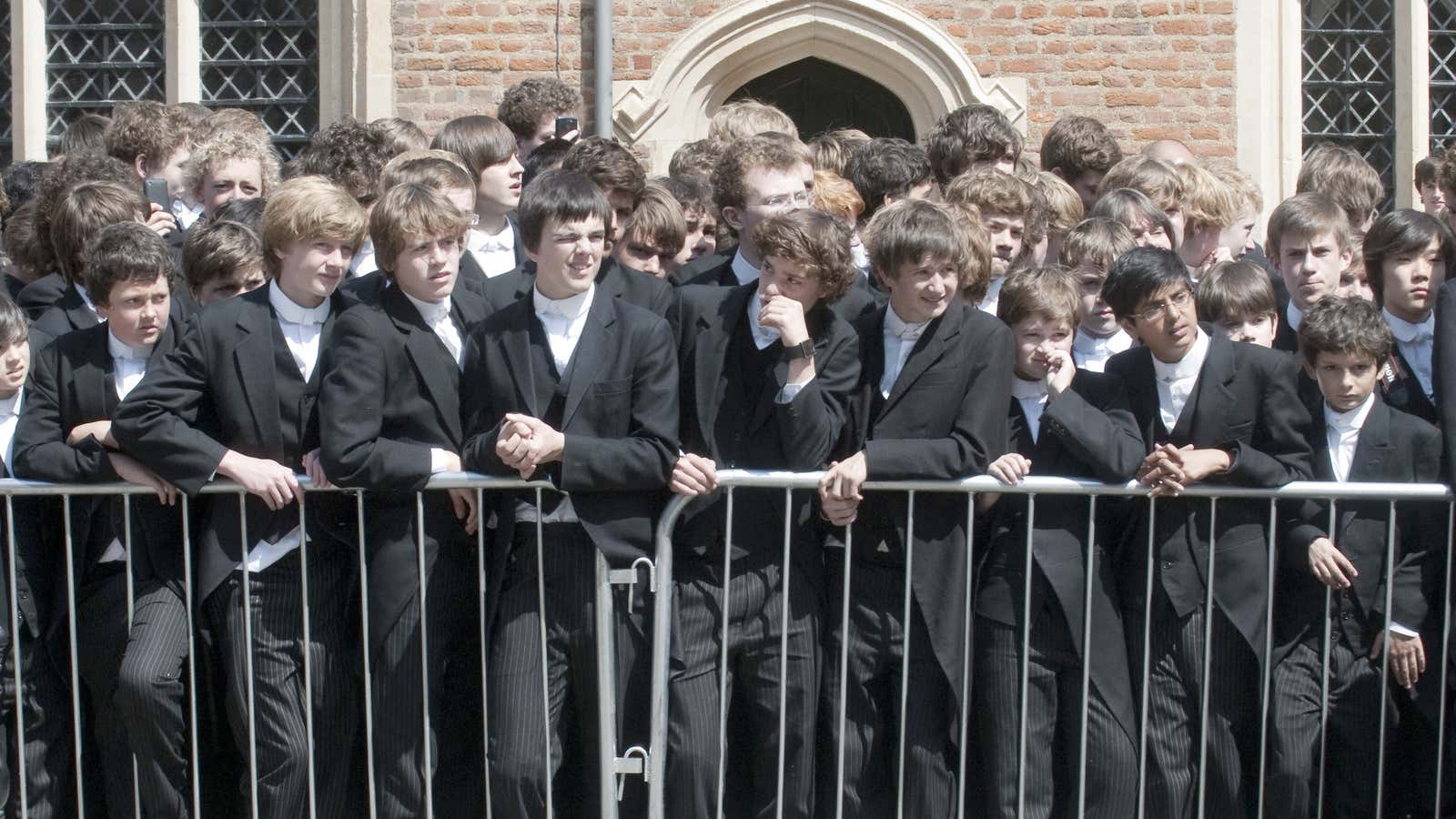Arthur Wellesley, the First Duke of Wellington, upon defeating Napoleon at Waterloo in 1815, famously said, “The Battle of Waterloo was won on the playing fields of Eton.” By which he meant that Eton College, the UK boys’ prep school founded by Henry VI in 1440, was the world’s best preparation for leadership, strategy, and life.
No secondary school has quite the same redolance, romance, and cachet as Eton College. No single discovery about a newly acquainted English male will make you think differently of him—for good or for ill—as much as learning that he is an Old Etonian. There is no better proof of an institution’s prestige than its fictional alums, and Eton’s got some of the best: James Bond (expelled for bedding a chambermaid), Captain Hook (whose dying words in the original Peter Pan play are “Floreat Etona“: May Eton flourish), and Lord Grantham from Downton Abbey (who revealed this in a recent episode when he said, “If I’d cried blue murder everytime someone at Eton tried to kiss me, I’d have been hoarse within a month.)
If you want more recent and real-life examples, those are a-plenty too, including Justin Welby, the brand-new Archbishop of Canterbury. As the Guardian’s Andy Beckett points out, this list on Eton’s web site of famous Old Etonians is “long” and “dizzying.” It’s hard to know where to begin. David Cameron, for example, is the 19th Old Etonian Prime Minister on this list.
Beckett gives a brief history of Eton’s mystique, saying “Etonmania” didn’t really exist till some four centuries after the school’s founding, and that the school’s reputation later took a pounding as elitism became very unfashionable:
According to [Nick Fraser’s 2006 book The Importance of Being Eton], “Etonmania”, like so many supposedly eternal British traditions, only started in the reign of Queen Victoria. From the 1860s to the early 1960s, the school enjoyed a golden age of power and prestige. Then its influence plummeted. The Etonian-packed, slightly drifting Tory administrations of Harold Macmillan and Alec Douglas-Home were blamed for Britain’s apparent decline.
In the modern day, one might assume that Eton’s glory was a thing of the past. For one thing, it’s consistently outranked in the Financial Times’ annual secondary school rankings by the likes of the more modern St. Paul’s School. This year, Eton ranks 17th—highly respectable to be sure, but maybe not what one might expect for the country’s top leader-producer. For another thing, the school uniform is still a dark morning coat—dapper and cute on a 13-17-year-old, but there are very few places in the world where you could pull this off without getting beaten up by townies. And Eton schoolmasters didn’t stop caning boys till 1984.
Despite all this seeming tweeness, Eton is not only flourishing , but is catching its second wind, writes Beckett, partly because the UK is well past socialism and is now embracing the 1% just like its American cousins:
Other trends are working in Eton’s favour. With annual fees of £32,067 – more than the average after-tax British household income – Eton is, more than ever, “a luxury brand”… As the super-rich and the wish to imitate them have strengthened… “luxury brands have come back”. Like Britain’s many other luxury businesses, Eton has improved its product. “When I was there in 1958 to 1963, the bottom 40% of boys did absolutely no work,” says Simon Head, fellow of the Rothermere American Institute at Oxford University. “That’s gone. Eton has hunkered down. It’s mobilised itself for the global economy.”
Another reason that Eton can now safely admit it is elite, says Beckett, is that Britain’s top state schools have become more and more like fee-paying schools and actually want to emulate them. Beckett writes:
The patchy egalitarianism of postwar state schooling is giving way to a more traditional philosophy: stricter uniforms and rules, pupils organised into private school-style “houses”, more powerful headteachers, more competition and difference between schools. It is a philosophy increasingly friendly to Eton. The current headmaster, Tony Little, remembers his first headship at another private school in the late 80s: “The local comprehensive wouldn’t invite me over the threshold. That has changed massively. The number of phone calls I get from heads of academies has greatly risen in the last two, three years. They want to visit, they want to collaborate.”
As a sign of the changing times, Etonians recently mocked their own exceptionalism (kind of) in “Eton Style,” a send-up of “Gangnam Style”, which raps about the “Original Rousseaus” in the library. And of course, they’re in full uniform.
